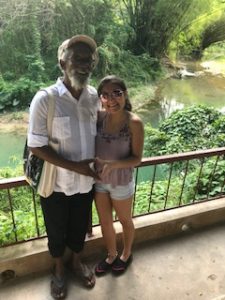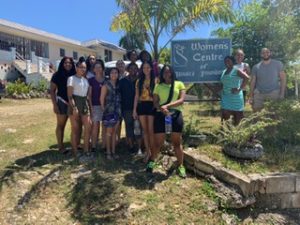Reflective Letter
Throughout this course I have learned abundance of helping skills, skills, similarities in the mistakes professionals make, ethics, legal obligations, self-understanding, etc. All of the skills and learning components of this course intertwine; some might intertwine more than others, but definitely play a big role in being a part of this profession. Some of the skills I have learned are empathy, active listening, and summarizing. I recently demonstrated the skill of being empathetic to someone who is gay and someone who is a New York City starlet. They poured their heart out on Instagram saying how long they have been struggling and how is own family doesn’t accept them, and he is constantly struggling with his insecurities. I decided I was going to respond to this message, of course I didn’t have to, but I wanted to. “I am so glad you shared your story this was so heartbreaking and inspiring at the same time. You must feel liberated to finally express this. Hope you live your best life to the fullest and embrace yourself!! Be you and don’t be scared to be yourself. If someone can’t accept you for who you are, I say **** them. It’s their loss. You do you hun :).” He then replied with “thank you so much and your words of understanding and acceptance is very much appreciated <3 . xo.” I bring this as an example because he mentions how I understood where he was coming from when I say he probably feels liberated/free to finally say what he feels. Sometimes it’s hard to say what you feel or may be difficult to people figure out what they actually feel and why. This is an important part of being in this field/profession because if your client feels that you understand them, they are going to be feel connected to you, be able to open up to you more, think that you are trustworthy, and most importantly come back to you for the next appointment. Another part of this piece is the advice giving, as I have learned over the course is advice giving as a beginning practitioner is not okay, it may seem like you are not focusing on their strengths and their potential. Also it can give the client the indication that you are helping solve the problem and you will continue to that during the time you are spending time with them. Advice giving is better when you have understood your client, established goals, and their challenges.
Another part of the human service professional field that is important to understand and to keep in the back of your mind is role-playing. Role-playing can be very helpful and less stressful when it comes to difficult situations. For example, let’s say your client is struggling with expressing her feelings to her parents and the reason why is because she was shown and told to shut their feelings down, that they are too sensitive, and they never take them seriously. The main reason is because everything they say is always wrong or they say it the wrong way, and that is what is holding them back. Of course, there are more problems to deal within this situation, but when talking about how they can practice what they want to say is with the professional. In this case it would have to be in the time period where the relationship is where it can be to say some things that a beginner wouldn’t say, where the professional knows the situation, their challenges, and understands the person; including their values, beliefs, fears, and failures. The role-playing in this situation can be helpful in the way it brings their confidence up, can give them a way to practice what to say, can give them the time to speak about it more in depth with the professional, and most importantly lower their stress level. If the professional were to say something or suggest something that involves their family values it could mess up a lot of things: the flow of the meeting, the trust, the helping relationship, and the doubt of not understanding each other. That is why it is important to know when to say something that is not appropriate or ethical to do. You should know when to say something and when not to say something.
The APA format and writing skills have a lot to do with in creating your treatment plan. For starters there is always a beginning, a middle, and an end. First organize a “draft” per say, you will have notes and/or keep head notes while you are in session. With the notes you have completed, you will have an idea what the goal, problem, and outside problems your client may have or have. Then, you will gather your thoughts and come up with conclusions for yourself, just for you though. After, you talk to your client and talk to them and see what they want to work with, what they want to focus on, how they want to deal with their problem, you want them to be in control of the their situation, you want them to come up with their solutions or ways they can get to their goal. By then, you are in the middle almost to the end. The end of all of this is to maybe discuss what their goal will look like, how do they see themselves from 6 months from now, talk and focus about their strengths and talk about how they can use that to solve their problems, and another thing that can be explored here are their fears or doubts to help them relieve some stress or to start fresh. Finally, the last time will to summarize what you did in the meeting and discuss the progress and the plans that were mentioned. This helps you be organized and will help you later on if you have to go back to your notes and refer to what you are talking about or even when you have to refer your client. If you have to refer someone, you have to give all your notes you have on your client, so the practitioner who is getting your client will have a better understanding of them and their situations, and can see what they can do.
Where my learning is learned
I chose this video because it explores Jamaica’s culture:dances, in which we were showed and some even danced along with the instructor as you can see in the video. I also learned a lot more about Jamaica throughout this day and I feel like it’s one of the days I learned the most. Some of the things we learned were dances,history, marriage, and more of its culture.
What areas did you feel most successful or improved the most?
I chose this photo because it’s where everything hit me at once. What I mean by that is Jamaica has its own culture and so do the Rastafarian Village people. They believe and do so much to get to where they are and they are proud of it. They have to do things on their own to get to ends meet and sometimes that requires to work all day. For example, some of the things they do is make drums, make chocolate, and make these bowls that are multi-purpose.

How do you see this course’s content intersecting with your field or career?
I see this course content intersecting with my field because it is something I will need in order to become a professional, a good one too. The content we have learned such as empathy, active listening, being genuine, how to be a good listener/observer, and being warm all include in becoming a good professional. While in Jamaica, the Women’s Center showed that these skills are more important than you think and it changes in a heartbeat, especially when it comes to being genuine and being empathetic. Another point of reference of this is when I mentioned Dr. Key giving her speech.

Have you been able to apply concepts you have learned in the course to what you do at work or in other courses?
I have been able to apply concepts that I have learned in this course with my other classes and at work. Being a good observer and one of voice are the main ones. How you say things can change a conversation in so many ways. For example, the other day at work I replied to my manager about a question she had. The way I replied made it seem like I was coming off feisty/ nasty with her. Of course I didn’t mean in that way, it’s just the way it came out. Sometimes what you say and what you mean don’t match up with how you mean it and it changes the original meaning; the tone of voice matters when you are talking to someone. Which brings me to my next point being a good observer. One of my co-workers always talks about his feelings; every time he does his body language always matches up with what he’s saying. The other week he told me how he was sad and anxious and it really showed. He was slouching, had a sad face, was jumpy, and he was distant. As said in the textbook it’s important to know what sad looks like for everyone because sometimes you don’t want to assume your client is feeling something they’re not. In my friends situation I knew what he was feeling, but if it was the other way around I would have to confirm with him if that’s what he was feeling. The video I chose is one of the times I was being a good observer. This is also mentioned in my e-portofolio. You can refer to helping skill #4.
How, when, where, and why you might use this information or skill in the future?
I might use in this information or skills in the future in my career when I am working with disabled children. Some skills will be more needed than others such as being empathetic, active listening, being warm, and genuine. There will be other skills that will be utilized, but whether you are working with disabled children, the homeless, adults, kids, adolescents, you utilize all the above. There is nothing different other than the disability. Even with the disability, they are still people, they are just like us. Working with the girls also showed me that, yes they lack resources that we have, but they are still like us. Even though they have teen moms, they are still like us; they eat, they have problems, they love, they cry, they succeed, they do and experience everything we do, so why should we treat them any less. Additionally, keeping in mind the differences we do have such as the values, beliefs, culture, family, and everything else is something that will be helpful in treating and talking to clients. I also mention this in my e-portofolio.